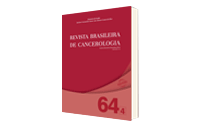Women Perception of their Functionality and Quality of Life after Mastectomy
DOI:
https://doi.org/10.32635/2176-9745.RBC.2018v64n4.198Keywords:
Breast Neoplasms, Mastectomy, Modified Radical, Physical Therapy Modalities, Quality of Life, RehabilitationAbstract
Introduction: In Brazil, the breast cancer diagnosis usually occurs an advanced stage, culminating in more aggressive treatments that lead to greater functional and psychological sequelae that interfere negatively in the quality of life. Objective: This study aimed to understand and describe the patients’ perception about the impact of cancer treatment and the contribution of physiotherapy to recovery their quality of life and functionality. Method: It ́s a qualitative study with twenty-nine women, underwent modified radical mastectomy and who presented a restriction of the range of motion of the upper limb. The patients underwent ten physiotherapeutic sessions and, in the end, they were submitted to semi-structured interviews, categorized in relation to the effects of oncological treatment, post-surgical limitations, concept of quality of life and impact of physical therapy on return to daily activities of daily living. Results: After the treatment, the patients reported functional, emotional and self-esteem improvement, allowing their social reinsertion and return activities of daily living. Conclusion: Through the reports, it was possible to conclude that the rehabilitation promoted positive results in the quality of life and functionality and we could have a broader perception about the impact of the illness and oncological treatment in the daily life of these women, thus subsidizing ways to improve the physiotherapeutic care to this population.Downloads
Download data is not yet available.
Downloads
Published
2018-12-31
How to Cite
1.
Fireman K de M, Macedo FO, Torres DM, Ferreira FO, Lou MB de A. Women Perception of their Functionality and Quality of Life after Mastectomy. Rev. Bras. Cancerol. [Internet]. 2018 Dec. 31 [cited 2025 Dec. 13];64(4):499-508. Available from: https://rbc.inca.gov.br/index.php/revista/article/view/198
Issue
Section
ORIGINAL ARTICLE









